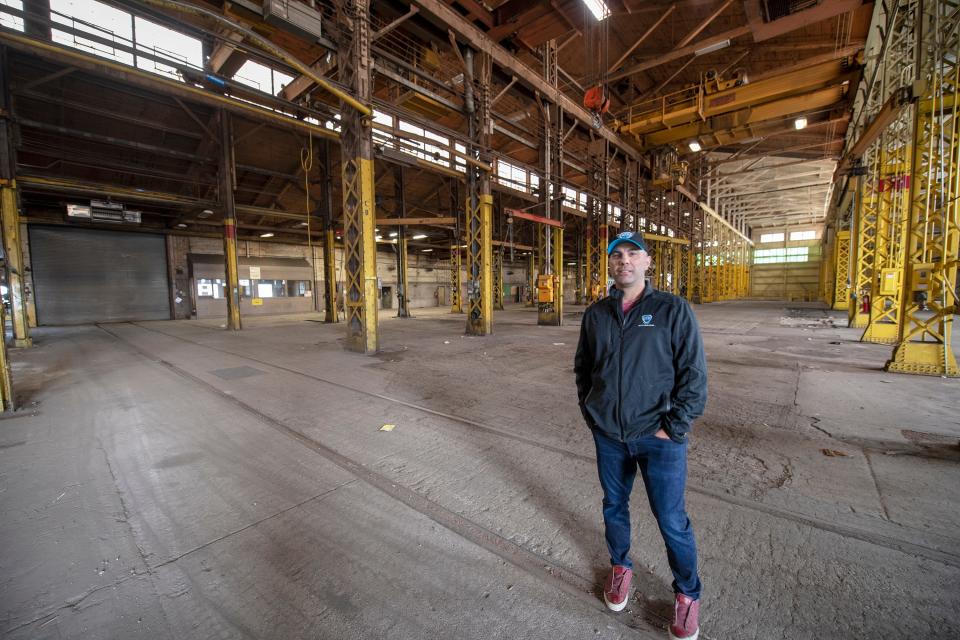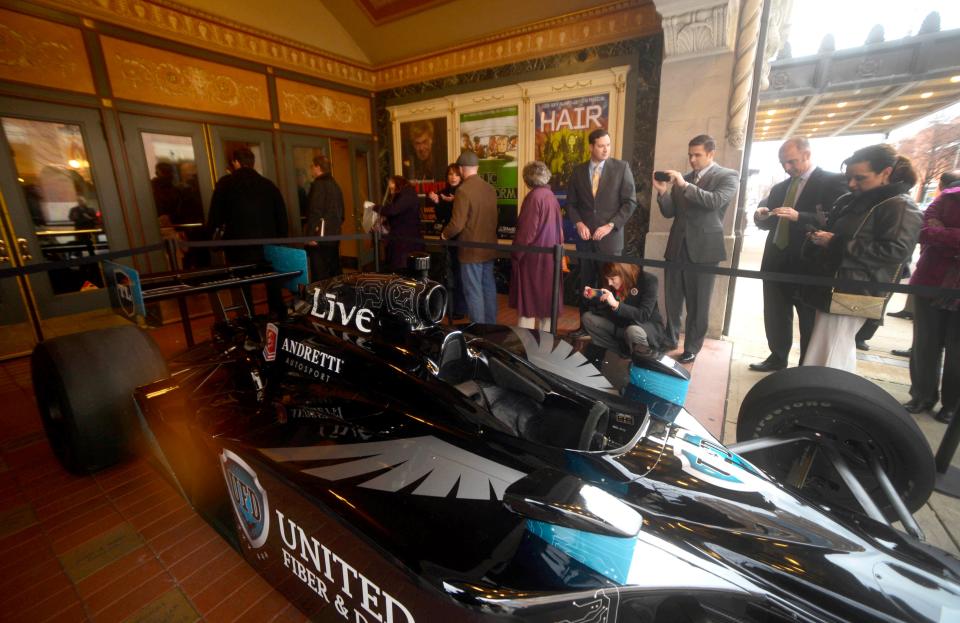Louis Appell III, others testify against Bill Hynes at hearing on alleged $4M UFD theft
Louis J. Appell III just wanted to see the job his father began through.
That job was investing in a fiber optic line built by a company started by the members of the rock band Live under the aegis of United Fiber & Data. He described the family's involvement in the company in testimony during a preliminary hearing Tuesday for former UFD CEO Bill Hynes, accused of stealing more than $4 million from the company he ran to maintain a lavish lifestyle and support his interest in something called “Stadium Super Truck” racing.
In 2012, Appell’s father, Louis J. Appell Jr., revered as a man whose investments and philanthropy shaped this corner of the world, joined with the members of the homegrown rock band Live to launch a company to build a 340-mile fiber optic line from New York to Ashburn, in the northern Virginia suburbs of D.C.

The project was touted as an economic bonanza, promising to create 300 jobs in York and generate billions in tax revenue while building a high-tech center in York, creating a kind of Silicon Valley centered in a formerly blighted neighborhood in the city’s heart.
Appell Jr. initially invested $7 million in the new company, launched during a lavish press conference in 2012. Between 2013 and 2016, according to court documents, Appell Jr. pumped an additional $19.25 million into the company.
In March 2016, the Appell family was considering putting more money into the company, which, to that date, had not returned on the investment. They decided to invest more money into the business.
When Appell Jr. died on June 27, 2016, his son, Appell III and his daughter, Helen, met with Hynes, who presented the case for putting more money into the business, and decided to put in another $10 million.
Appell III testified that Hynes told them the fiber optic line would be built in nine months and cost another $24 million, though he said he could probably do it for $22 million.
The project foundered. “We found out around the end of that year that no progress had been made,” Appell III testified during the five-hour hearing. “They were still trying to cross the Hudson River, and there were issues in Weehawken” in northern New Jersey.
Completion of the line was always three months away, Appell III said. And Hynes kept asking Appell III for more money. He kept investing in UFD. He estimated that the family has put $40 million into the company.
At one point, UFD needed some up-front money to qualify for a state grant under the Redevelopment Assistance Capital Program – known by its acronym RACP. The program, intended to invest in blighted neighborhoods in which traditional investment was not available, would reimburse investors who put money into projects that otherwise would not qualify for funding.
UFD, under Live’s Think Loud umbrella of limited-liability corporations, was looking to renovate its headquarters on York Street, in an old industrial building on the edge of a blighted city neighborhood. Appell III said Hynes asked him to put up the $5 million for the project, under a promissory note, promising to pay the money back with interest once the state reimbursed UFD for the project.
Appell III paid the bills from the local construction giant Kinsley as the work was being done. Once it was finished, he waited for the reimbursement from UFD.
Months passed. Appell III testified that he would occasionally ask Hynes what was going on with the RACP money and he would say nothing.
It wasn’t until later, November 2019, after Hynes left UFD when he was facing charges brought by a former girlfriend who accused him of stalking and abusing her, that Appell III testified he learned a stunning truth. On June 7, 2018, the York County Redevelopment Authority forwarded a check for $3,388,027 to UFD, the memo indicating that it was the RACP funds from the state.
Later, UFD accountant Vicki Goodling testified that after the RACP check had been deposited, bank statements showed that more than a million of it had been moved to a little-used Think Loud account that, before the deposit, had a balance of $570.13.
Hynes, she said, had authority to make the transfer, as he did with all of the business accounts. Money was moved from account to account, including some going into BKS Investments and into personal accounts held by Hynes. Goodling said she was “not sure what (BKS Investments) was.” She also said, “I have never seen anything quite like it before.”
During Goodling's testimony, the accountant reviewed two sets of invoices from a television production company - one set indicating expenses paid on behalf of UDF and others showing that the payments were made to support “Stadium Super Truck” racing. The invoices, she testified, were identical, down to dates and invoice numbers, but showed different expenses. She testified that the expenses were for a TV commercial for UDF, and that Hynes told her the commercial had been produced but that “it wasn’t good.”
Meanwhile, Appell III testified, Hynes never told him the RACP money had arrived. Hynes' attorneys asserted that the money was only one of several grants from the state, suggesting that the payment due to Appell III hadn’t been approved by the state, that his reimbursement had been held up by bureaucratic red tape.
Appell III, as well as prosecutors and investigators, allege otherwise. “I didn’t know about it,” Appell III said. “That’s the whole issue.”
Appell III testified that Hynes, at the time, was trying to acquire the former Metso property, across the railroad tracks from Think Loud's York Street headquarters, and asked Appell III for money to close the deal. Appell III said he’d think about it once he got reimbursed from RACP. Hynes had put a $400,000 deposit on the Metso property – intending to develop it into a retail, entertainment and residential property – and needed the money to close the deal.
Appell III testified he hadn’t agreed to that and that he wouldn’t consider it until he was reimbursed for his approximately $4 million investment into the Think Loud building. He discussed the matter with his wife, Chandra, a former prosecutor, saying he was tired of dealing with Hynes and asked her to handle it.
Chandra Appell testified that she texted Hynes but was not satisfied with his answers, replying to his initial response that she and her husband “need something more than that.”
Chandra Appell testified, “We felt we were getting the runaround from the defendant. He wasn’t being candid.”
Appell III testified he didn’t receive any reimbursement until after Hynes left the company when he was charged in the domestic case. (Hynes made a plea deal in that case and had been sentenced to house arrest. He denies the charges.)
That’s the crux of the case against Hynes, facing felony charges of theft by failure to make required disposition of funds and theft by deception by false impressions. Hynes has denied the charges, believing that the accusations had been amicably settled in July 2022 when a civil lawsuit in the matter was resolved, and that he has “significant exonerating evidence” that will clear him of the charges.

The saga of Live and Hynes: Rolling Stone magazine digs into the litigious, drama-filled saga of York rockers
His lawyers cited a civil matter that was settled in August 2022. According to a statement, UFD and Appell III confirmed “all outstanding claims against Mr. Hynes and his related entity have been mutually, fully and fairly settled, including all allegations of fraud, theft of funds and related allegations of wrongdoing.”
One of Hynes' lawyers, Gavin Lentz, argued that the charges against Hynes were of a civil nature and that since it was settled, Hynes should not be sitting in the defendant’s chair in the small courtroom in District Magisterial Judge Thomas Harteis’ office. At one point, Lentz suggested Appell III was accusing Hynes of the crimes alleged by the state.
Prosecutor Tim Barker argued the civil matter does not preclude the filing of criminal charges. As an example, he said, a settlement by an insurance company in a fatal car wreck does not prevent the filing of vehicular homicide charges. He also said Appell III was not making the criminal accusation, the state of Pennsylvania was.
Appell III testified he agreed to the settlement “under duress.”
“I didn’t get a dime from it,” Appell III testified. “I had to sign the settlement. The company would fold if we didn’t.”
Appell III testified that UFD is still operating and generating about $3 million a year in gross revenues. He said he believed he would never recoup his investment in the company. (The company has also generated a flurry of lawsuits containing accusations and counter-accusations over finances.)
After five hours of testimony, the hearing was adjourned. It will resume on Dec. 19.
Columnist/reporter Mike Argento has been a York Daily Record staffer since 1982. Reach him at mike@ydr.com.
Lawsuit-apalooza for Live: Band members, associates trade accusations in blitz of filings
This article originally appeared on York Daily Record: Louis Appell III testifies in Bill Hynes hearing on $4M theft

